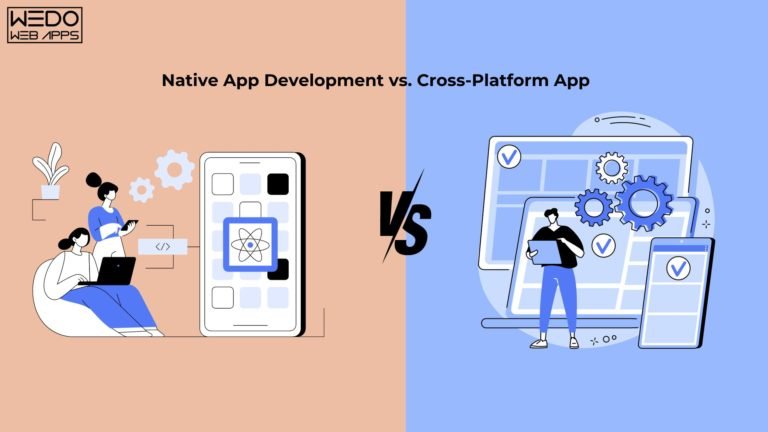5 Dec, 2023 | Mobile App Development
Which is Better: Native App Development vs. Cross-Platform App

Understanding Native App Development
Native app development involves creating applications specifically tailored to a particular operating system (OS) or platform, such as iOS or Android. These apps are written in platform-specific languages like Swift or Objective-C for iOS and Java or Kotlin for Android. Let's delve into the advantages and drawbacks of native app development:Advantages of Native App Development
- Performance Excellence: Native apps are known for their superior performance. They take full advantage of the device's hardware, resulting in smoother animations and faster load times.
- Optimized User Experience: Native apps provide a seamless and intuitive user experience, as they are designed according to the guidelines and UI patterns of each platform.
- Access to Device Features: Developers can harness the full potential of device-specific features, such as GPS, cameras, and sensors, to create feature-rich apps.
- Security: Native apps are generally considered more secure because they adhere to platform-specific security protocols.
Drawbacks of Native App Development
- Higher Development Costs: Building separate apps for each platform can be costlier and time-consuming, as it requires two separate development teams.
- Maintenance Challenges: Maintenance becomes complex when updates and bug fixes must be deployed separately for iOS and Android.
- Limited Code Reusability: The codebase is not easily transferable between platforms, leading to code duplication.
Unpacking Cross-Platform App Development
Cross-platform app development, on the other hand, allows developers to create a single codebase that can run on multiple platforms. This approach uses frameworks like React Native, Flutter, or Xamarin. Here's a closer look at its benefits and limitations:Advantages of Cross-Platform App Development
- Cost Efficiency: Developing a single codebase for multiple platforms significantly reduces development costs.
- Faster Time to Market: Cross-platform development allows for quicker development and deployment, which can be a competitive advantage.
- Code Reusability: A significant portion of the codebase can be reused a cross platforms, saving time and effort.
- Simplified Maintenance: Updates and bug fixes can be implemented once and applied across all platforms.
Drawbacks of Cross-Platform App Development
- Performance Limitations: Cross-platform apps may not achieve the same level of performance as native apps, especially for graphics-intensive or highly complex applications.
- Limited Access to Platform Features: Some platform-specific features may be challenging to access or require additional customization.
- Dependency on Third-Party Libraries: Cross-platform development often relies on third-party libraries, which may have compatibility issues or limitations.
Making the Choice: Native vs. Cross-Platform
Now that we've examined both approaches, the decision between native and cross-platform app development boils down to your specific project requirements. Here are some factors to consider: Project Complexity: For simple apps with basic features, cross-platform development may suffice. However, for complex or performance-critical applications, native development is often the better choice. Budget and Time Constraints: If you have limited resources and need to launch quickly, cross-platform development can be more cost-effective and time-efficient. User Experience: If providing the best possible user experience is a top priority, especially for graphics-rich apps or games, native development is the way to go. Long-Term Maintenance: Consider the long-term maintenance requirements of your app. If you anticipate frequent updates, cross-platform development might be more manageable. User Interface and Design: One critical aspect to consider is the user interface and design of your app. If you aim to provide a highly customized and platform-specific design, native development allows for greater flexibility in crafting a UI that aligns perfectly with the native guidelines. Native apps can offer pixel-perfect design, intricate animations, and a more natural feel. In contrast, cross-platform frameworks often require more effort to achieve the same level of design fidelity. Scalability and Future Growth: Think about the long-term scalability and growth potential of your app. If your project has the potential to expand to new platforms or if you plan to integrate with emerging technologies, native development may offer more room for growth. native apps on android can adapt more easily to changes in platform requirements and hardware advancements. Development Team Expertise: Take into account the proficiency of your team in development. If your team is proficient in specific programming languages, such as Swift, Objective-C, Java, or Kotlin, native development may be a more natural fit. Conversely, if your team has experience with cross-platform frameworks like React Native or Flutter, this expertise can significantly expedite development. Market and Target Audience: Analyze your target audience and the markets you plan to enter. Different regions may have varying preferences for iOS or Android devices. In some cases, you might find that one platform dominates a particular market. Understanding your audience's platform preferences can influence your development strategy. Third-Party Integrations: Think about the third-party integrations your app requires. If your app heavily relies on platform-specific APIs or third-party libraries that are more readily available for one platform, it may impact your decision. Cross-platform development might require additional effort to bridge the gap between platforms in such cases. Testing and Quality Assurance: Never undervalue the significance of testing and quality assurance. Native apps typically require separate testing for each platform, which can be more time-consuming and resource-intensive. Cross-platform development offers some advantages in terms of testing, as a single codebase simplifies the testing process across multiple platforms. Now that we've covered a comprehensive overview of native and cross-platform app development, let's delve deeper into the comparisons and considerations surrounding these approaches, incorporating the keywords you mentioned. Read also: Native App v/s Web App: Which One Should I Choose?Cross-Platform vs. Native: A Closer Look
When it comes to choosing between cross-platform and native development, it's essential to weigh the pros and cons carefully. Let's compare these two methodologies more directly:Cross-Platform vs. Native
- Development Approach: Cross-platform development involves creating a single codebase that can run on multiple platforms, reducing development effort and costs. Native development, in contrast, requires separate codebases for each platform, resulting in a potentially higher upfront investment.
- Time to Market: Cross-platform development often boasts a faster time to market, thanks to code reusability and streamlined development. This advantage can be a game-changer for startups and businesses aiming for rapid product releases. Native development may take longer due to the need for platform-specific development.
- User Experience: Native apps excel in providing a tailored user experience. They adhere closely to platform-specific design guidelines, resulting in apps that feel intuitive and native to each operating system. Cross-platform apps might require extra effort to achieve a similar level of user experience.
- Performance: Native apps generally outperform cross-platform counterparts, especially when it comes to graphics-intensive or complex applications. This performance gap is because native apps have direct access to platform-specific hardware and APIs, optimizing performance.
- Development Costs: Cross-platform development shines in terms of cost efficiency, as it reduces development costs by sharing a single codebase a cross platforms mobile development vs native. Native development can be more expensive due to the need for separate development teams and codebases.
Native Cross-Platform Mobile Development
- Hybrid Approaches: Some approaches bridge the gap between native and cross-platform development. Technologies like React Native and Flutter enable developers to write code that has a native-like feel while still maintaining cross-platform compatibility. These tools are becoming increasingly popular due to their ability to combine the best of both worlds.
- Android Native Apps: Android, being one of the dominant mobile platforms globally, often leads businesses to consider native development for this platform. However, it's worth noting that there are cross-platform options available for Android as well, providing cost-effective alternatives.
- User Interface and Design: Native apps offer precise control over the user interface and design, allowing for pixel-perfect customization. Cross-platform frameworks may require extra effort to achieve this level of design fidelity, making it an essential consideration for design-centric projects.
- Third-Party Integrations: The ease of integrating third-party services and APIs can vary between native and cross-platform development. Native development can provide more straightforward access to platform-specific integrations, whereas cross-platform development might require additional work to bridge the gap.
Native Apps vs. Cross-Platform Apps
- Performance: Native apps consistently deliver top-notch performance thanks to their direct access to platform resources. This performance advantage is critical for applications requiring real-time responsiveness, such as gaming or multimedia apps.
- Cost-Effectiveness: Cross-platform apps stand out as cost-effective solutions, particularly for projects with tight budgets. Sharing a codebase across platforms can significantly reduce development expenses.
- Maintenance: When it comes to maintaining apps post-launch, cross-platform development offers simplification. Updates and bug fixes can be applied once and propagated across all platforms, streamlining the maintenance process.
- Market Reach: Cross-platform development extends your market reach by allowing your app to run on multiple platforms with a single codebase. Native apps, while offering platform-specific advantages, require separate development for each platform.
Conclusion
In the ever-evolving landscape of app development, the choice between native and cross-platform approaches is a critical one. There is no one-size-fits-all answer, as the decision should align with your project's specific needs, budget, and timeline. Both native and cross-platform development have their advantages and drawbacks, and understanding these nuances is essential for app development agencies and businesses aiming to deliver successful mobile applications. Ultimately, the success of your project depends on your ability to make an informed decision and adapt to the evolving needs of your target audience. Whether you choose native or cross-platform app development, the key is to deliver an app that meets user expectations and provides value in today's competitive app market. Remember, when seeking expert guidance on app development, consider consulting an app development agency that specializes in your chosen approach. Their expertise can be invaluable in navigating the complex world of mobile app development. So, whether you choose native or cross-platform app development, remember that the ultimate goal is to create an app that not only meets your business objectives but also delights and engages your target audience. The success of your project depends on your ability to adapt to the evolving needs of your users and deliver a mobile app that stands out in a crowded app ecosystem. Which path will you choose for your next mobile app project? The answer lies in the unique requirements and goals of your venture.Frequently Asked Questions
- Native: Developed specifically for one platform (iOS or Android) using platform-specific languages.
- Cross-platform: Built to function across multiple platforms using a single codebase.
Native apps often offer a more seamless user experience because they are tailored for each platform's design guidelines, resulting in a more native "feel." Cross-platform apps strive for uniformity across platforms, which can sometimes lead to a less native experience.
Native apps often have easier access to platform-specific features, providing more flexibility in incorporating advanced functionalities. While cross-platform tools constantly improve, there might still be limitations in implementing some advanced features uniformly across all platforms.
Consider the app's complexity, target audience, required features, development budget, and timeline. If you need high performance, access to specific device features, and have separate budgets for each platform, native might be preferable. For cost-effectiveness, quicker development, and uniformity across platforms, consider cross-platform development.

